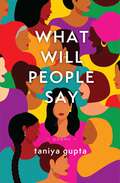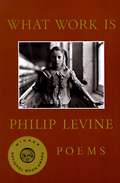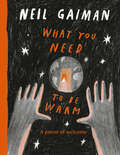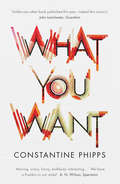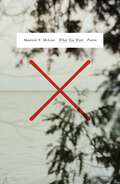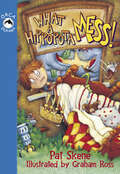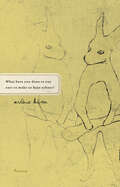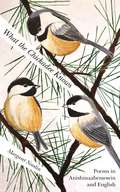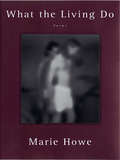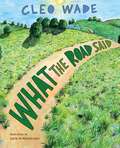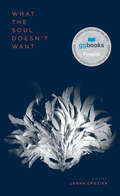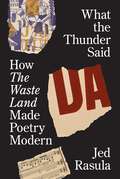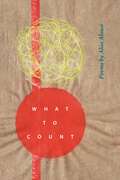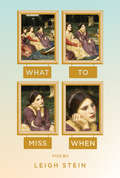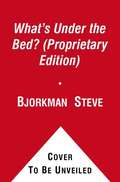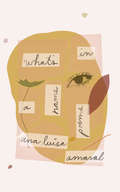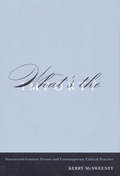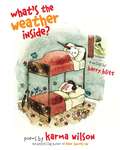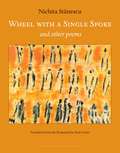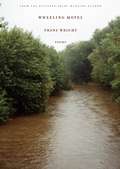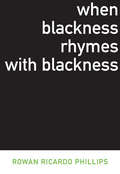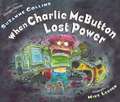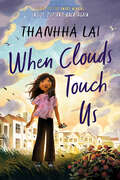- Table View
- List View
What Will People Say: Poems
by Taniya GuptaI had to fight for my existence before I was even out of my mother&’s womb. If I didn&’t stop fighting then, why would I stop now?What Will People Say follows a South Asian woman&’s journey through being a daughter, and later a daughter-in-law, within the strict confines of her patriarchal family. Readers watch as the narrator navigates life, trying to find a safe place for herself, until she finally becomes her own hero. Grappling with the subjects of sexual and psychological trauma, as well as mental health, this collection of poetry carves a path beyond the guilt of wondering: &“What will people say?&”
What Work Is
by Philip Levine"This collection amounts to a hymn of praise for all the workers of America. These proletarian heroes, with names like Lonnie, Loo, Sweet Pea, and Packy, work the furnaces, forges, slag heaps, assembly lines, and loading docks at places with unglamorous names like Brass Craft or Feinberg and Breslin's First-Rate Plumbing and Plating. Only Studs Terkel's Working approaches the pathos and beauty of this book. But Levine's characters are also significant for their inner lives, not merely their jobs. They are unusually artistic, living 'at the borders of dreams.' One reads The Tempest 'slowly to himself'; another ponders a diagonal chalk line drawn by his teacher to suggest a triangle, the roof of a barn, or the mysterious separation of 'the dark from the dark.' What Work Is ranks as a major work by a major poet . . . very accessible and utterly American in tone and language." --Daniel L. Guillory, Library Journal<P><P> Winner of the National Book Award in 1991
What You Need to Be Warm
by Neil Gaiman Pam Smy Yuliya Gwilym Nadine Kaadan Daniel EgnéusDuring the coldest season, when the world feels scary—what do you remember about being warm? Baked potatoes. Trust. A kettle on the stove. Blankets. A smile. And, most of all, the reassurance that you belong. <p><p>In his powerful and moving poem, featuring illustrations from thirteen extraordinary artists, bestselling author and UNHCR Goodwill Ambassador Neil Gaiman draws together many different memories to answer the question, what do you need to be warm? <P><P><i>Advisory: Bookshare has learned that this book offers only partial accessibility. We have kept it in the collection because it is useful for some of our members. Benetech is actively working on projects to improve accessibility issues such as these.</i> <p> <b>New York Times Bestseller</b>
What You Want
by Constantine PhippsPatrick is still in love with his separated wife. Returning with their son after a trip to an amusement park, he begs, one last time, to reconcile with her. When she refuses, he is driven to thoughtless desperation: a bottle of sleeping pills, a bottle of whisky. And in his dying dream, he revisits that theme park of childish desire. There he finds the landscape - still garish and indulgent - has evolved. The attractions are religion, money and sex. The characters - costumed and acted - are transformed into Jefferson, Xunzi, Aristotle. And their purpose is to instruct Patrick in the pursuit of happiness throughout human history. But Patrick can only answer with his own story. He remembers falling in love with Louise. Recalls the enlightenment of their youth and the banality of their family life. He tells of their marriage, how it came under strain after the birth of his son; how he cheated; the unravelling of all his joy. Yet still his love persists. Beginning with the first line of Dante's Divine Comedy and taking in Disneyworld, the Declaration of Independence and the canon of philosophy in its stride, What You Want is a literary feat: a novel written entirely in verse, depicting life in all its ordinariness. It gives voice to a new Everyman and brings forth an unparallelled modern epic.
What You Want: Poems
by Maureen N. McLaneNational Book Award finalist Maureen N. McLane stuns with a precise, perceptive book of poetic meditations.In her first book of poems since the scintillating More Anon: Selected Poems, Maureen N. McLane offers a bravura, trenchant sounding out of inner and outer weathers. What You Want is a book of core landscapes, mindscapes, and shifting moods. Meditative, lyrical, alert to seasons and pressures on our shared life, McLane registers and shapes an ambient unease. Whether skying with John Constable or walking on wintry paths in our precarious republic, the poet channels what Wordsworth called “moods of my own mind” while she scans for our common horizon. Here are poems filled with gulls and harbors, blinking red lights and empty lobster traps, beach roses and rumored sharks, eels and crows, wind turbines and superhighways. From Sappho to the Luminist painter Fitz Henry Lane, from constellations to microplastics, What You Want is a book alive to the cosmos as well as to our moment, with its many vexations and intermittent illuminations. In poems of powerful command and delicate invitation, moving from swift notations to sustained sequences, this collection sees McLane testing what (if anything) might “outlast the coming heat.” And meanwhile, “There’s no end / to beauty and shit.”
What a Hippopota-Mess! (Orca Echoes)
by Pat Lamondin SkeneThe poems in this book tell stories of animals and nature. From two sweaty hippos, a smiling lizard and some creepy crawlers to a few tricky dandelions. At the end of each poem, find out more in an interview with a key character or a list of fascinating facts. The epub edition of this title is fully accessible.
What have you done to our ears to make us hear echoes?: Poems
by Arlene KimThis debut poetry collection blends fairy tales with Korean folklore as it examines the experience of immigration and identity. In her stunning debut poetry collection, What have you done to our ears to make us hear echoes?, Arlene Kim confronts the ways in which language mythologizes memory and thus exiles us from our own true histories. Juxtaposing formal choices and dreamlike details, Kim explores the entangled myths that accompany the experience of immigration—the abandoned country known only through stories, the new country into which the immigrant family must wander ever deeper, and the forked paths where these narratives meet and diverge. Sharing ground with Randall Jarrell&’s later poems, and drawing on a dizzying array of sources—including Grimm&’s Fairy Tales, Korean folklore, Turkish proverbs, Paul Celan, Anna Akhmatova, Antonin Dvorak&’s letters, and the numerous fictions we script across the inscrutabilities of the natural world—Kim reveals how a homesickness for the self is universal. It is this persistent and incurable longing that drives us as we make our way through the dark woods of our lives, following what might or might not be a trail of breadcrumbs, discovering, finally, that &“we are the only path.&”Winner of the 2012 American Book AwardPraise for What have you done to our ears to make us hear echoes? &“Using fairy tale archetypes like axes and keys, and diverse cultural references—from the Romanovs and code ciphers to Korean birth rituals—Arlene Kim recasts the experience of family immigration in language that manages to be both lush and restrained. This is a book to savor, give your friends, and let echo in your ears for a long time to come.&” —Katrina Vandenberg, author of Atlas &“In this young century, American writing has rapidly changed and the impact of this book proves Arlene Kim is a part of this exciting transformation. Her poetry and prose challenge the concept of genre as they redefine the role of the imagination.&” —Ray Gonzalez, author of Muy Macho
What the Chickadee Knows (Great Lakes Books Series)
by Margaret NoodinMargaret Noodin explains in the preface of her new poetry collection, What the Chickadee Knows (Gijigijigaaneshiinh Gikendaan), "Whether we hear giji-giji-gaane-shii-shii or chick-a-dee-dee-dee depends on how we have been taught to listen. Our world is shaped by the sounds around us and the filter we use to turn thoughts into words. The lines and images here were conceived first in Anishinaabemowin and then in English. They are an attempt to hear and describe the world according to an Anishinaabe paradigm." The book is concerned with nature, history, tradition, and relationships, and these poems illuminate the vital place of the author’s tribe both in the past and within the contemporary world. What the Chickadee Knows is a gesture toward a future that includes Anishinaabemowin and other indigenous languages seeing growth and revitalization. This bilingual collection includes Anishinaabemowin and English, with the poems mirroring one another on facing pages. In the first part, "What We Notice" (E-Maaminonendamang), Noodin introduces a series of seasonal poems that invoke Anishinaabe science and philosophy. The second part, "History" (Gaa Ezhiwebag), offers nuanced contemporary views of Anishinaabe history. The poems build in urgency, from observations of the natural world and human connection to poems centered in powerful grief and remembrance for events spanning from the Sandy Lake Tragedy of 1850, which resulted in the deaths of more than four hundred Ojibwe people, to the Standing Rock water crisis of 2016, which resulted in the prosecution of Native protesters and, ultimately, the completion of the Dakota Access Pipeline on sacred land. The intent of What the Chickadee Knows is to create a record of the contemporary Anishinaabe worldview as it is situated between the traditions of the past and as it contributes to the innovation needed for survival into the future. Readers of poetry with an interest in world languages and indigenous voices will need this book.
What the Living Do: Poems
by Marie Howe"A deeply beautiful book, with the fierce galloping pace of a great novel."--Liz Rosenberg Boston Globe Informed by the death of a beloved brother, here are the stories of childhood, its thicket of sex and sorrow and joy, boys and girls growing into men and women, stories of a brother who in his dying could teach how to be most alive. What the Living Do reflects "a new form of confessional poetry, one shared to some degree by other women poets such as Sharon Olds and Jane Kenyon. Unlike the earlier confessional poetry of Plath, Lowell, Sexton et al., Howe's writing is not so much a moan or a shriek as a song. It is a genuinely feminine form . . . a poetry of intimacy, witness, honesty, and relation" (Boston Globe).
What the Road Said
by Cleo WadeWhat the Road Said is the New York Times-bestselling comforting and uplifting picture book from bestselling poet and activist Cleo Wade. Which way do I go? That is your choice to make, said the Road.But what if I go the wrong way?The Road curved a little, almost as if it was giving me a hug, and said,Do not worry. Sometimes we go the wrong way on our way to the right way.It's okay to be afraid or to sometimes wander down the wrong path. Bestselling poet and activist Cleo Wade's What the Road Said features illustrations by Lucie de Moyencourt and encourages us to lead with kindness and curiosity, remembering that the most important thing we can do in life is to keep going.
What the Soul Doesn't Want
by Lorna CrozierIn her newest collection, Lorna Crozier describes the passage of time in the way that only she can. Her arresting, edgy poems about aging and grief are surprising and invigorating: a defiant balm. At the same time, she revels in the quirkiness and whimsy of the natural world: the vision of a fly, the naming of an eggplant, and a woman who — not unhappily — finds that cockroaches are drawn to her. “God draws a life. And then rubs it out / with the eraser on his pencil.” Lorna Crozier draws a world in What the Soul Doesn’t Want, and then beckons us in. Crozier’s signature wit and striking imagery are on display as she stretches her wings and reminds us that we haven’t yet seen all that she can do.
What the Thunder Said: How The Waste Land Made Poetry Modern
by Jed RasulaOn the 100th anniversary of T. S. Eliot’s modernist masterpiece, a rich cultural history of The Waste Land’s creation, explosive impact, and enduring influenceWhen T. S. Eliot published The Waste Land in 1922, it put the thirty-four-year-old author on a path to worldwide fame and the Nobel Prize. “But,” as Jed Rasula writes, “The Waste Land is not only a poem: it names an event, like a tornado or an earthquake. Its publication was a watershed, marking a before and after. It was a poem that unequivocally declared that the ancient art of poetry had become modern.” In What the Thunder Said, Rasula tells the story of how The Waste Land changed poetry forever and how this cultural bombshell served as a harbinger of modernist revolution in all the arts, from abstraction in visual art to atonality in music.From its famous opening, “April is the cruellest month, breeding / Lilacs out of the dead land,” to its closing Sanskrit mantra, “Shantih shantih shantih,” The Waste Land combined singular imagery, experimental technique, and dense allusions, boldly fulfilling Ezra Pound’s injunction to “make it new.” What the Thunder Said traces the origins, reception, and enduring influence of the poem, from its roots in Wagnerism and French Symbolism to the way its strangely beguiling music continues to inspire readers. Along the way, we learn about Eliot’s storied circle, including Wyndham Lewis, Virginia Woolf, and Bertrand Russell, and about poets like Mina Loy and Marianne Moore, whose innovations have proven as consequential as those of the “men of 1914.”Filled with fresh insights and unfamiliar anecdotes, What the Thunder Said recovers the explosive force of the twentieth century’s most influential poem.
What to Count (Made in Michigan Writers Series)
by Alise AlousiWith heart and insight, the poems in Alise Alousi’s What to Count speak to what it means to come of age as an Iraqi American during the first Gulf War and its continuing aftermath, but also to the joy and complexity of motherhood, daughterhood, and what it means to live a creative life. More than a description of the world, Alousi’s poetry actively lives in and of the world. These poems explore the nuances of memory through the changes wrought by time, conflict, and distance. In "The Ocularist" and "Art," and others, Alousi’s extraordinary verbal deftness precisely locates the still-tender pains and triumphs of collective being while trying to be an individual in the world. What to Count is a remarkable collection of contemporary poetry—both a lyrical splendor and a contemplative account of lineage, silenced history, and identity.
What to Miss When: Poems
by Leigh SteinPoems about pop culture, mortality, and the internet, written during the Coronavirus pandemic—for readers who are more likely to double-tap Instapoems than put their phone down long enough to read The Decameron.Catalyzed by sheltering in place and by a personal challenge to give up alcohol for thirty days, Leigh Stein, the poet laureate of The Bachelor, has written a twenty-first-century Decameron to frame modern fables. What to Miss When makes mischief of reality TV and wellness influencers, juicy thoughtcrimes and love languages, and the mixed messages of contemporary feminism. &“Think Starlight,&” the first poem in this collection, written before any self-quarantine orders, imagined the likelihood that the United States would follow in Italy&’s footsteps in terms of caseload and hospital overwhelm. By March 17, 2020, the imagined was the real: New York City had closed schools, bars, and restaurants—with the rest of the country close behind. With nihilist humor and controlled despair, What to Miss When explores fears of death and grocery shopping, stress cleaning and drinking, celebrities behaving badly, everything we took for granted, and life mediated by screens—with dissociation-via-internet, and looking for mirrors in a fourteenth-century pandemic text, a kind of survival response to living casually through catastrophe.
What's Under the Bed? (Bilingual)
by Joe FentonWhen Fred lays down his head, he imagines there is something monstrous under his bed. (bilingual English/Spanish)
What's in a Name
by Ana Luísa AmaralPoems of effervescent grace from one of the best-known and best-loved poets of Portugal With the elliptical looping of a butterfly alighting on one’s sleeve, the poems of Ana Lui´sa Amaral arrive as small hypnotic miracles. Spare and beautiful in a way reminiscent both of Szymborska and of Emily Dickinson (it comes as no surprise that Amaral is the leading Portuguese translator of Dickinson), these poems—in Margaret Jull Costa’s gorgeous English versions—seamlessly interweave the everyday with the dreamlike and ask “What’s in a name?” “How solid is a name if answered to,” Amaral answers, but “like the Rose—no, like its perfume: ungovernable. Free.” There is much freedom within Amaral’s poetry, room for mysteries to multiply, and yet her beautiful lines are as clear as water: And that time of smiles Which does, incidentally, really exist, I swear, as does the fire And the invisible sea, which with nothing will agree
What's the Import?
by Kerry McsweeneyKerry McSweeney critiques such readings of Romantic, Victorian, and 19th-century American poems. In What's the Import? he proposes and exemplifies an aesthetic or intrinsic critical model rooted in literary-historical contextualization that considers the determination of meanings to be only one of the qualities that full engagement with a poem requires. His wide-ranging study discusses poems by Wordsworth, Keats, Tennyson, Browning, Whitman, Dickinson, Carroll, Dante and Christina Rossetti, Swinburne, Hopkins, Hardy, and the Michael Field poets. What's the Import? contributes to the current debates in North America about the state and direction of English studies and the teaching of literature in general.
What's the Import?: Nineteenth-Century Poems and Contemporary Critical Practice
by Kerry McSweeneyKerry McSweeney critiques such readings of Romantic, Victorian, and 19th-century American poems. In What's the Import? he proposes and exemplifies an aesthetic or intrinsic critical model rooted in literary-historical contextualization that considers the determination of meanings to be only one of the qualities that full engagement with a poem requires. His wide-ranging study discusses poems by Wordsworth, Keats, Tennyson, Browning, Whitman, Dickinson, Carroll, Dante and Christina Rossetti, Swinburne, Hopkins, Hardy, and the Michael Field poets. What's the Import? contributes to the current debates in North America about the state and direction of English studies and the teaching of literature in general.
What's the Weather Inside?
by Karma Wilson Barry BlittHere are more than 120 hysterical, philosophical, rhetorical, and commonsensical poems and pictures that explore the perfectly not-so-perfect world of picky kids, Miss Muffet's revenge, magic homework wands, yellow snow, and Sunday's sundaes! New York Times bestselling author Karma Wilson and renowned New Yorker cartoonist Barry Blitt have created a brilliantly entertaining poetry collection sure to be a source of pleasure and inspiration to kids everywhere.
Wheel With a Single Spoke: and Other Poems
by Nichita Stanescu Sean CotterWinner of the Herder Prize, Nichita St?nescu was one of Romania's most celebrated contemporary poets. This dazzling collection of poems - the most extensive collection of his work to date - reveals a world in which heavenly and mysterious forces converse with the everyday and earthbound, where love and a quest for truth are central, and urgent questions flow. His startling images stretch the boundaries ofthought. His poems, at once surreal and corporeal, lead us into new metaphysical and linguistic terrain.
Wheeling Motel
by Franz WrightIn his tenth collection of poetry, Franz Wright gives us an exquisite book of reconciliation with the past and acceptance of what may come in the future. From his earliest years, he writes in "Will," he had "the gift of impermanence / so I would be ready, / accompanied / by a rage to prove them wrong / . . . and that I too was worthy of love." This rage comes coupled with the poet's own brand of love, what he calls "one / strange alone / heart's wish / to help all / hearts." Poetry is indeed Wright's help, and he delivers it to us with a wry sense of the daily in America: in his wonderfully local relationship to God (whom he encounters along with a catfish in the emerald shallows of Walden Pond); in the little West Virginia motel of the title poem, on the banks of the great Ohio River, where "Tammy Wynette's on the marquee" and he is visited by the figure of Walt Whitman, "examining the tear on a dead face."Here, in Wheeling Motel, Wright's poetry continues to surprise us with its frank appraisal of our soul, and with his own combustible loneliness and unstoppable joy.From the Hardcover edition.
When Blackness Rhymes with Blackness
by Rowan Ricardo PhillipsIn When Blackness Rhymes with Blackness, Rowan Ricardo Phillips pushes African American poetry to its limits by unraveling "our desire to think of African American poetry as African American poetry." Phillips reads African American poetry as inherently allegorical and thus "a successful shorthand for the survival of a poetry but unsuccessful shorthand for the sustenance of its poems." Arguing in favor of the "counterintuitive imagination," Phillips demonstrates how these poems tend to refuse their logical insertion into a larger vision and instead dwell indefinitely at the crux between poetry and race, "where, when blackness rhymes with blackness, it is left for us to determine whether this juxtaposition contains a vital difference or is just mere repetition." From When Blackness Rhymes with Blackness: Phillis Wheatley, like the epigraphs that writers fit into the beginning of their texts, is first and foremost a cultural sign, a performance. It is either in the midst of that performance ("at a concert"), or in that performance's retrospection ("in a cafe´"), that a retrievable form emerges from the work of a poet whose biography casts a far longer shadow than her poems ever have. Next to Langston Hughes, of all African American poets Wheatley's visual image carries the most weight, recognizable to a larger audience by her famed frontispiece, her statue in Boston, and the drama behind the publication of her book, Poems on Various Subjects Religious and Moral. All of this will be fruit for discussion in the pages that follow. Yet, I will also be discussing the proleptic nature with which African American literature talks, if you will, Phillis Wheatley.
When Blackness Rhymes with Blackness
by Rowan Ricardo PhillipsIn When Blackness Rhymes with Blackness, Rowan Ricardo Phillips pushes African American poetry to its limits by unraveling "our desire to think of African American poetry as African American poetry." Phillips reads African American poetry as inherently allegorical and thus "a successful shorthand for the survival of a poetry but unsuccessful shorthand for the sustenance of its poems." Arguing in favor of the "counterintuitive imagination," Phillips demonstrates how these poems tend to refuse their logical insertion into a larger vision and instead dwell indefinitely at the crux between poetry and race, "where, when blackness rhymes with blackness, it is left for us to determine whether this juxtaposition contains a vital difference or is just mere repetition." From When Blackness Rhymes with Blackness: Phillis Wheatley, like the epigraphs that writers fit into the beginning of their texts, is first and foremost a cultural sign, a performance. It is either in the midst of that performance ("at a concert"), or in that performance's retrospection ("in a cafe´"), that a retrievable form emerges from the work of a poet whose biography casts a far longer shadow than her poems ever have. Next to Langston Hughes, of all African American poets Wheatley's visual image carries the most weight, recognizable to a larger audience by her famed frontispiece, her statue in Boston, and the drama behind the publication of her book, Poems on Various Subjects Religious and Moral. All of this will be fruit for discussion in the pages that follow. Yet, I will also be discussing the proleptic nature with which African American literature talks, if you will, Phillis Wheatley.
When Charlie McButton Lost Power
by Suzanne Collins Mike LesterAn electifying picture book from the author of The Hunger Games. Charlie McButton likes computer games so much, he never plays with anything else. When a thunderstorm knocks out the electricity, his tech empire comes tumbling down, and his whole world loses power. He needs batteries--FAST. But the only triple A's he can find are in his little sister's talking doll. Will he resort to desperate measures and cause his little sister to have a meltdown of her own? Or will be snap out of his computer craze long enough to realize he can have fun with her, even without batteries? Suzanne Collins, author of the bestselling Hunger Games trilogy, and award-winning illustrator Mike Lester team up for a hilarious and timely tale that will crack up young computer addicts and those who love them.
When Clouds Touch Us
by Thanhhà LaiInspired by the author’s own childhood, this stunning novel in verse, sequel to the award-winning #1 bestseller Inside Out and Back Again, picks up two years after Hà and her family arrive in Alabama as refugees from the Việt Nam War.Hà and her family have worked hard to make a life for themselves in the US, but it hasn’t come easy. Hà has only just started to feel settled when Mother decides that the family will move to Texas for a new job. Hà knows how hard starting over is and doesn’t want to have to do it again. But sometimes even an unwanted change can bring opportunity, new friends, and a place to call home. This lyrical and compelling sequel to the National Book Award Medalist and Newbery Honor winning, #1 New York Times bestselling novel Inside Out and Back Again follows Hà and her family through another year of upheaval, growth, and love.
